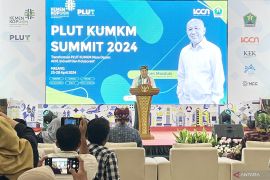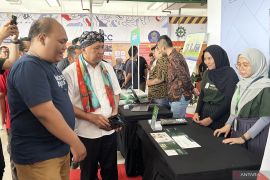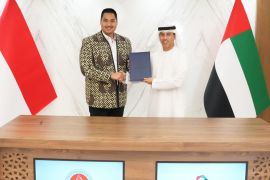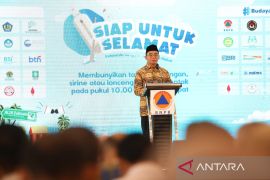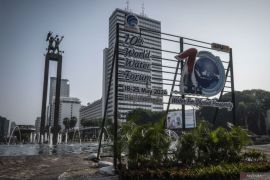"I just met with the management of PT MRT Jakarta and now it is clear that construction project will positively go ahead," Jakarta governor Joko Widodo (Jokowi) said.Jakarta (ANTARA News) - After several days of talks on the fate of the Jakarta Mass Rapid Transport (MRT) system, the development of which has been in limbo since the era of Jakarta governors Sutiyoso and Fauzi Bowo, the project has finally received the green light.
"I just met with the management of PT MRT Jakarta and now it is clear that construction project will positively go ahead," Jakarta governor Joko Widodo (Jokowi) said at the City Hall on Thursday night.
"However, there are several other things that still need to be explained in detail, such as the per kilometre construction cost of the project," he stated.
"Regarding the construction cost per kilometre, it seems we still need to call a tender for it. I think the costs could still be reduced. But, in general, matters relating to the MRT project have become clear and are no longer burdening my mind," Jokowi added.
Earlier, PT MRT Jakarta president director Tribudi Rahardjo said the per kilometre construction cost of the project would be Rp1 trillion.
The figure was obtained by dividing the total estimated cost of the project Rp16 trillion with the length of MRT, which will stretch 15.7 km from Lebak Bulus area in the South Jakarta to Hotel Indonesia in Central Jakarta.
At a meeting held on Wednesday, Jokowi failed to take a decision on whether to continue the project scrap it, because he did not have "a clear picture on the return of investment (ROI) and project costs".
Despite calling several meetings (the latest being on Thursday night) Jokowi could not decide on the future of the project, raising fears that the MRT project would remain in limbo.
"Although PT MRT Jakarta has explained many things to me the project over three meetings, I was not satisfied. There are still many non-technical problems. I have not yet understood whether PT MRT has discussed the necessary details with residents who will be affected by the project," the governor said.
PT MRT Jakarta acts as a sub-implementing agency in the project while the Jakarta Regional administration is the implementing agency and MRT Jakarta acts as the executing agency.
Although the governor has given the project the go-ahead, he said a decision was yet to be taken on the MRT ticket price. The management of PT MRT Jakarta on Wednesday said that the MRT ticket was expected to be set at Rp15,000.
"According to initial calculations, the price of the ticket was set at Rp38,000, which excludes a subsidy of Rp19,000. So, that would make the price of a ticket Rp19,000. But it's still expensive. We hope there would be more subsidy so the price could be lowered to Rp15,000. Yet, a bigger subsidy would burden the regional government," Jokowi said.
"I hope the price gets as low as Rp9,000, or US$1, similar to those of other countries," he stated.
"But at that price, the subsidy the regional government would have to bear would be too big. We cannot afford it. Therefore, we should seek assistance from the central government," Jokowi explained.
The governor said he was convinced that the previous governors had already carried out studies on the project`s social, economic and environmental impact.
The project was planned during the era of the then Jakarta governor, Fauzi Bowo, and its construction was expected to begin this year.
Earlier, Fauzi had stated that the first phase of the MRT project would begin in 2012, which would "cover the Utara-Selatan Lebakbulus-Hotel Indonesia route, stretched over 15.5 kilometres, with 10.5 kilometres overground and five kilometres underground".
"Six underground stations will be built along the route, namely at Masjid Al Azhar, Istora Senayan (Ratu Plaza), Bendungan Hilir, Setiabudi, Dukuh Atas, Bundaran Hotel Indonesia, and seven overground stations, namely at Lebak Bulus, Fatmawati, Cipete Raya, H Nawi, Blok A, Blok M and Sisingamangaraja," he explained.
"At the beginning of the operation, the MRT will have the capacity to carry 212,000 people per day, which can be raised later to 960,000 per day. The route can be covered in 30 minutes and the tickets will be integrated with the other relevant modes of transportation," Fauzi noted.
"Initially, there will be a five-minute train headway, with the possibility to make it a three-minute headway later," he said.
"For that purpose, up to 144,322 billion yen or Rp15 trillion will be needed. About 120,017 billion yen will be in the form of loans. Only 0.2 percent, or 24.305 billion yen, will be drawn from the state budget and regional budget," Fauzi had pointed out.
Jakarta residents, who face traffic jams every day, badly need the MRT system. Therefore, Jakarta should now have an MRT system to solve its traffic woes.
"Now is the time for the government to give special attention to the development of mass rapid transportation system. This is one of the keys to overcome traffic woes in big cities, including Jakarta," said Djoko Setijowarno, a transportation expert from the Semarang-based Soegijopranoto Catholic University.
Indonesian Outsourcing Businesses Association (ABADI) chairman Wisnu Wibowo said on Thursday that his organization supported the construction of the Jakarta mass transport system because it would make Jakarta traffic more orderly and commuters would feel more convenient.
"The presence of the Jakarta mass transport system would create business opportunities and enhance employment for Jakartans. It will need security guards, cleaners, ticket officials, parking attendants, food corners and many other things," he stated.
Jakarta`s Legislative Assembly (DPRD) deputy chief Triwisaksana agreed, saying Jakarta residents urgently needed a mass transportation system.
"The development of an MRT system which can transport large numbers of people speedily is important given the high number of commuters in Jakarta and its surrounding areas," he added.(*)
Reporter: Andi Abdussalam
Editor: Heru Purwanto
Copyright © ANTARA 2012
